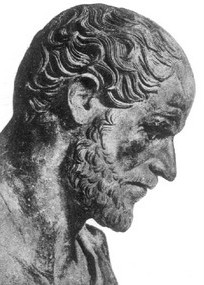Know thyself,
Anyway . . .
In class, I was actually arguing toward the same goal as Aristotle but I am inept at expressing the
There is a thing of power, an energy that is the connection of one Human with an Other Human. A characteristic of it is Jungian synchronicity: the concurrance of two events having a peculiar correspondence between them. Make no mistake, coincidence of this sort is not controlled by chance -- remember quantum mechanics, and the impossible becomes possible (and ain't that the definition of human existence?). The most powerful expression of this synchronicity, this thing of power, is sexual union when it culminates with the ever fleeting, simultaneous orgasm
Yes, gasp if you will, but how can we understand what is Good for Humans if we don't understand why we seek fullness of understanding with an Other. I posit that the same energy of understanding that comes during orgasm is the same energy of understanding when two Humans successfully communicate Ideas. The energy is the same whether in the Realm of the Physical or in the Realm of Forms (ha! sayeth Plato from somewhere within a cloud overhead) -- perhaps it is our pathway between the realms. Regardless, there can be no understanding of what Human is, or what Good is, unless we include this. After all, isn't this the same energy religion seeks to control, and spirituality seeks to understand?
Why are our friends, our friends? Because it feels good to have people around us who understand things similar to the way we do within ourselves. The closer a friend is to understanding us, the more likely we are to have sexual attractions -- which our society and culture have enslaved to the word Love with the shackles of legal and heterosexual marriage. We are confused by these sexual attractions because they lie outside the narrow parameters society & culture allow us to think about them. So when we think about these feelings we are usually puzzled as to 'where they came from." It is simply the energy of union of one Human with an Other Human(s). We also call this feeling charisma. But we call it that when One is so good at
At this juncture let me repeat an important bit of info: I got no answers. I don't know what I'm talking about, but I can surely feel it. And since nobody else has come up with an answer yet . . . ain't no reason I can't try my own way. 2000 years plus, guys . . . either we ain't been working on it, or we got the wrong plans. I can't wait another 2000 years, I may not have 2 more days.
Anyway . . .
We like that bond, that feeling of union. We seek union just as surely as those half-humans seek their other halves in the old Greek myth.
My concern is only what the word "Good" means to us when we say it. I say it means "Human." Aristotle also, but in a different way. That's the crux divergent point. Human = Good. Therefore war can be just and good if it is waged and comported around equal human rights. An example: it would be good to kill the people who won't stop tormenting the refugees in Darfur. Of course, Aristotle would side on Khartoum's side, the side of the slavers because they are the stronger and wealthier, and they can trace a historical lineage of being master to the Others historical lineage of being slave. But I can take my Human Good to slavery, as well, and do it for the better -- we know it better as indentured servitude as a result of criminal actions. When we jail a criminal we enslave the criminal -- no wordgames here. Why not make the slavery beneficial for both the criminal and society? How? Teach the criminal a trade and make the criminal do fulltime work for the state for the duration of incarceration. Is that not slavery? Is that not good?
Yes, slavery too has different strengths and feels. Yes, slavery too can be put upon Aristotle's two-dimensional lines. Yes, that two dimensional Aristotlian line can be one ray emanating from Apathy and riding the waves between the twin rays of Love and Hate.
Many other rays ride those waves between Love and Hate as nothing is truly separate from




2 comments:
I'm not sure if this is the correct way to do this, and in fact, i'm pretty sure this is entirely wrong...however,
HERE IS THE MISSION: Book 3 We will talk about bravery and temperance.
Ed, nice work. I'm beginning to see what you are coming from.
Book 3, OK, I'll see what i can do aboput getting it up on the blog.
Anybody can make comments, but you have to have a Google Blogger account to post new threads (at least i think you can post new threads using your account -- lemme know).
That way we can comment on each thread separately, and try to keep some Aristotlian Order to all of this.
(I like Aristotle . . . or I wouldn't argue with him)
Post a Comment